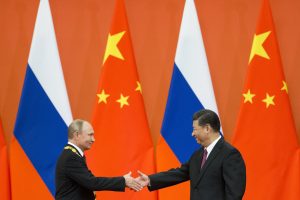On February 4, 2022, the opening day of the Winter Olympics in Beijing and only 20 days before Russia invaded Ukraine, China and Russia declared a “no limits” partnership that “surpasses an alliance.” This new upgrade of the bilateral relationship has been commonly accredited to the role of Presidents Xi Jinping and Vladimir Putin or, more precisely, their special friendship. Indeed, the two leaders often describe each other as “best friends” and are believed to have a close personal relationship. Therefore, the so-called no limits partnership is actually the one between Putin and Xi.
Emphasizing the role of authoritarian leaders in shaping their countries’ foreign policy is analytically justifiable. In highly centralized authoritarian political systems, such as China and Russia, channels for open policy deliberations are limited, and the impact of experts and the public on foreign policy is less significant. Moreover, in the case of China-Russia relations, significant advancements in terms of strategic alignment happened after Xi assumed control of the Chinese Communist Party in 2012.
However, a more careful analysis reveals that while the Putin-Xi friendship is important, it mostly oils the wheels of a relationship driven by longer-term structural trends. Those trends are unlikely to be reversed any time soon. China-Russia strategic alignment is likely to stay, and Russia’s war in Ukraine is unlikely to cause it to unravel.
The Putin-Xi Bromance and China-Russia Cooperation
From the moment Xi became CCP general secretary in 2012, China-Russia relations displayed a new upward trend. Being of roughly the same age, Putin and Xi have long been seen as friends with a level of trust higher than what had been the norm between the two countries. According to some observers, “Putin has more trust in Xi than in any Chinese leader before him and any current Western leader” and the “sincerity that Putin feels in Xi has helped the Kremlin to adjust many policies towards China.”
Xi selected Russia as the destination of his first foreign trip after assuming the presidency and became the first foreign leader to visit the Russian military command center in Moscow. He emphasized at the time that “strong China-Russia relations not only answer to our interests but also serve as an important, reliable guarantee of an international strategic balance and peace.” Putin, in turn, stated that China and Russia were “natural partners and natural allies,” using the word “ally” that Moscow had previously eschewed with respect to China.
Putin and Xi have met with each other more than 40 times since 2012, and their words of greeting have evolved from “dear president” to “dear friend” and later to “my old friend.”
During the 2014 phase of the Ukraine crisis, when Russia annexed Crimea and established separatist governments in Ukraine’s Donbas region, Putin-Xi relations did not waver. Not only did the Ukraine crisis of 2014 not shake the base of the China-Russia strategic partnership but, in fact, it pushed it to the next level. When Russia faced isolation and sanctions, Xi consistently demonstrated his personal support for Putin.

































